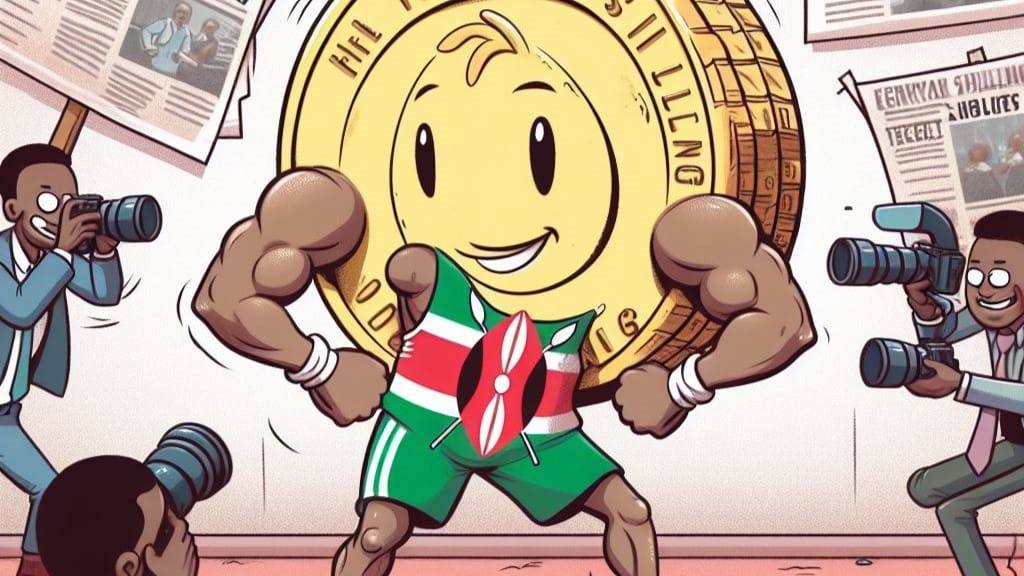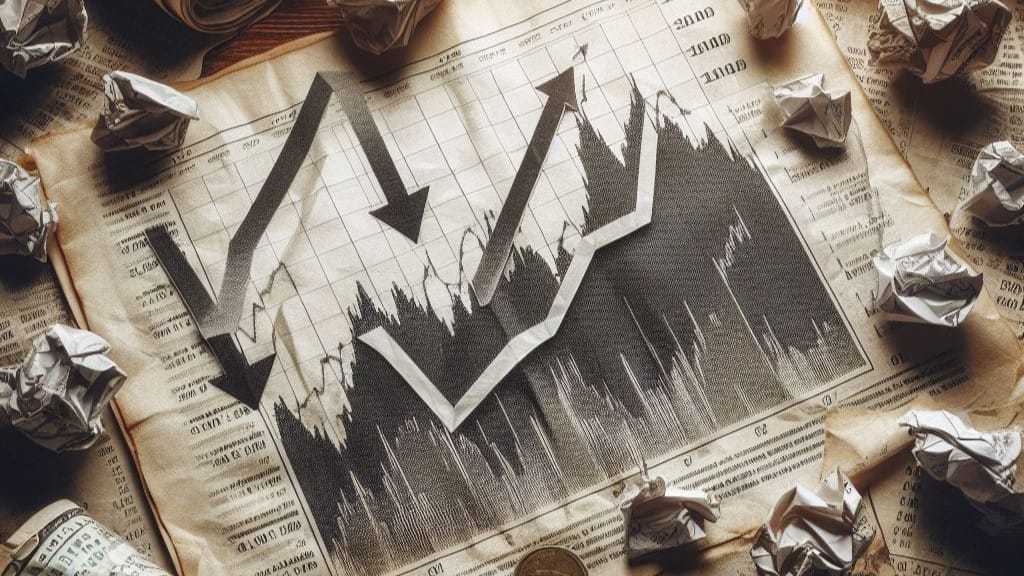Stable is good, and KES is the best
Another short week in April with a mid-week break to mark Eid meant one less day to hear about the strengthening shilling. Perhaps a strong shilling had become a rarer sight than my new favourite word...syzygy. Either way, two weeks back all indicators were steady, last week, they were go! The CBK is taking a very...central role in nearly all the news but you'll soon see why.
These are the main stories that caught our eyes and ears in the week:
- Interest rates give CBK some breathing room
- CMA optimistic about NSE performance
- Economic growth looking like a five
SPOTLIGHT
KES has been putting in the reps

If you're reading this in Kenya, you're in the home of the best-performing currency in Sub-Saharan Africa. The shilling's recent gains have been hard to ignore and World Bank chimed in last week.
What happened?
"The Kenyan shilling is the best-performing currency in the subcontinent, as it recorded an appreciation of 16% so far this year," said World Bank. Sentiment: Positive
Between the lines
Focus on the underlying catalyst(s) to inform decision making. Here the World Bank attributed the shilling’s appreciation to:
- CBK increasing the CBR rate currently at 13.0% from 10.5% following two consecutive hikes in December & February; and
- Improved investor confidence after Kenya secured funds to settle its first Eurobond that falls due in June, allaying concerns of a default event.
Should you care?
Yes. As highlighted last week's issue, interest rates have a direct impact on a currency's value. CBK's borrowing objectives are likely to dictate near term direction. Stability > Volatility.
HEADLINES
The week's big stories
- Interest rates give CBK some breathing room: Treasury bill interest rates saw their first drop in over two years at last weeks auctions. “We expect rates to have peaked. One of the reasons the rates have been going up to where they are now has been the reliance on domestic financing,” said CBK Governor. Watch to see the impact across the yield curve. Bond holders at high yields could start booking decent gains.
- CMA optimistic about NSE performance: "In the short time that the Kenya shilling has appreciated, trading on the Exchange has increased 70 per cent and the NSE is now ranked as one of the best-performing Exchanges,'' CMA chairman Ugas Mohamed said. Last year, NSE recorded a 27.5 per cent drop in paper wealth worth Sh547 billion, largely on a weak shilling that had sunk to an all-time low of Sh165 units to the US dollar. Worth looking at the highlights of the CMA's recently unveiled strategic plan .
- Economic growth looking like a five: The CBK & World Bank both released economic growth projections for Kenya for 2024. CBK is projecting 5.7% GDP growth vs the World Bank's 5.2% and IMF's 5.0% projections “…mainly supported by the rebound in the agriculture sector attributed to favourable weather conditions, the resilience of the services sector and improved global growth outlook,” according to CBK Governor, Dr. Kamau Thugge. All generally positive; read into the details to see where there are differences in opinion.
INSIGHT
Explained by AI (and I): Paper Gains/ Losses

A term you will hear often in the world of investments is paper gains or losses in reference to paper wealth.
Definition: Paper gains and losses refer to unrealized profits or losses on investments that have not yet been sold. They are called "paper" gains or losses because they exist only on paper and have not been realized through the actual sale of the investment.
Significance: Understanding paper gains and losses is important for investors because they impact the overall performance of their investment portfolio. Investors may choose to realize paper gains by selling investments when they believe the value has reached a peak. Conversely, they may hold onto investments with paper losses in the hope that the value will recover over time.
Managing paper gains and losses is an essential aspect of investment strategy, as investors aim to maximize their returns and minimize their losses over the long term.
--
"The stock market is designed to transfer money from the active to the patient." -Warren Buffet
Remember, you don't actualize a gain or a loss until you take action on the underlying asset. Before reacting to short term fluctuations in the markets as a signal, always check against your longer term investment strategy. In a future edition, we will look at the significance of paper gains & losses with respect to financial institutions to help you understand how these can impact the performance of securities you hold (especially banks & insurance companies).
ICYMI
IMF raises concerns on expensive alternative lending. According to the International Monetary Fund (IMF), the heightened cost of borrowing from regulated banks because of high central banks' policy rates could prompt credit migration from traditional credit sources to private credit which creates many potential risks. “While immediate risks may seem contained, the sector could experience large, unexpected losses in a downturn.” Bank lending to the private sector may continue to slow down precipitating financial risks.
Banks lobby to keep State billions. The lenders held KES 509.8 billion worth of deposits from government ministries, departments and agencies (MDAs) by the end of June 2023.The Treasury expects the rollout of the Treasury Single Account (TSA) model, which was approved by the Cabinet in January, to take three years. The TSA aims to provide the government with a consolidated view of its total available cash balances at any given time, spanning across Ministries, State Organs, State Departments, State Agencies/Corporations, and other government entities. Pay attention to implementation plan if you're invested in banks as this could deny some banks 'cheap' deposits.
One liners
Kenya targets World Bank loan to clear Eurobond balance [East African]
Big banks on CAK radar forced to refund customers over hidden fees [Business Daily]
Safaricom’s Mali unit trust asset base hits Sh1.4bn [Business Daily]
EA stock market chiefs mull issuing dollar-denominated securities to cushion investors [East African]
REGION
What in the East Africa?
[UG] Uganda economy to grow by 7% – IMF: According to the IMF, the economic recovery in Uganda continues to gain strength, following a rapid decline in inflation, favourable agriculture and robust industrial and services activity.[Link]
[UG] Bank of Uganda raises rates to highest levels in nearly 7 years: The bank Monday raised its policy rate to 10.25 per cent, its highest level since May 2017. Explaining its decision, it said that despite the “prevailing conditions” of reduced demand and increased supply from producers, there was still a risk of high inflation. [Link]
[TZ] Local counters shine at DSE in Q1: CRDB remains the top mover for the quarter accounting for 55 per cent of the total turnover followed by TBL at 17 per cent while NMB and TPCC equally accounted for 10 per cent of the turnover. [Link]
[TZ] Inflation rate in March remains unchanged: Annual headline inflation rate for March this year has stagnated at 3.0 per cent as it was in the previous month implying that the prices of various goods during the period under review remained unchanged. [Link]
[ET] Ethiopia faces tough devaluation decision to secure IMF bailout: Ethiopia may have to decide on a big currency devaluation sooner rather than later to secure a rescue loan from the International Monetary Fund (IMF), which left the country last week without reaching a much-needed deal with authorities. The IMF, which said progress was made during its latest visit, has not said that currency reform is necessary for its support. [Link]
RADAR
Worth watching this week
- Israel-Iran tensions will be watched closely by markets which will be wary of any signs of escalation.
- CBK is hosting a webinar on Investing in Kenya Government Securities on Tuesday, April 16, 2024. Register here.
- The shilling, of course, and interest rates.
CURIOUS
Two good not to share
One: Staying completely attentive to a single thing for longer than a few minutes in todays world can feel like an uphill task…"Focused attention is an endangered species". This 6-min video from Big Think with psychologist, Dr. Daniel Coleman may be worth your attention.
Two: Another Just A Band track is trying to find a place in my "Monday Music" playlist and I'm not complaining...are you?
Thank you for making it this far. We hope you picked up something that might add to your paper wealth and you start the week stronger than the shilling. You can also read last week's edition on interest rates here.
As always, have the best week possible.
Yours truly.
Get This Weekly | Buy Me A Coffee | Feedback | Follow My X | My Band
